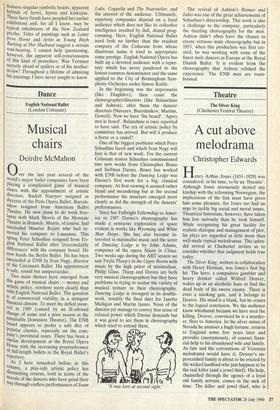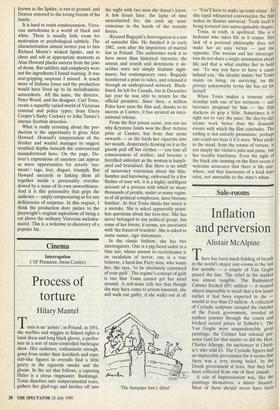Theatre
The Silver King (Chichester Festival Theatre )
A cut above melodrama
Christopher Edwards
Henry Arthur Jones (1851-1929) was considered, in his time, to be an lbsenite'.
Although Jones strenuously denied any kinship with the reforming Norwegian, the implications of the link must have given him some pleasure, for Jones too had an urge to tackle big social and moral issues.
Theatrical historians, however, have taken him less seriously than he took himself. While recognising his great facility for realistic dialogue and management of plot, his plays are regarded as little more than well-made topical melodramas. This splen- did revival at Chichester invites us to consider whether that judgment holds true today.
The Silver King, written in collaboration with Henry Herman, was Jones's first big hit. The hero, a compulsive gambler and heavy drinker called Wilfred Denver, wakes up in an alcoholic haze to find the dead body of his sworn enemy. There is even a smoking gun, and it belongs to Denver. His mind is a blank, but he comes to the logical conclusion. We the audience know whodunnit because we have seen the killing. Denver, convinced he is a murder- er, flees to America. In the silver mines of Nevada he amasses a hugh fortune, returns to England some five years later and provides (anonymously, of course) finan- cial help to his abandoned wife and family.
As fate and the conventions of Victorian melodrama would have it, Denver's im- poverished family is about to be evicted by
the wicked landlord who just happens to be the real killer (and a jewel thief). His help,
channelled through the agency of a loyal old family servant, comes in the nick of time. The killer and jewel thief, who is known as the Spider, is run to ground, and Denver restored to the loving bosom of his family.
It is hard to resist condescension. Victo- rian melodrama is a world of black and white. There is usually little room for motivation or pyschological subtlely. The characterisation almost invites you to hiss Richard Moore's wicked Spider, and to cheer and sob at appropriate moments as Alan Howard plucks success from the jaws of doom. But subtlety and complexity were not the ingredients I found wanting. It was seat-gripping suspense I missed. A touch more of Indiana Jones and the production would have lived up to its melodramatic antecedents. All the same, the director, Peter Wood, and the designer, Carl Toms, create a superbly varied world of Victorian criminal and police types; from Garry Cooper's flashy Cockney to John Turner's intense Scottish detective.
What is really arresting about the pro- duction is the opportunity it gives Alan Howard. Howard's intepretation of the drinker and wastrel manages to suggest troubled depths beneath the conventional misunderstood hero. On the page, De- nver's expressions of emotion can appear as mere opportunities for actorly 'mo- ments': rage, fear, disgust, triumph. But Howard succeeds in linking them all together inside a personality oversha- dowed by a sense of its own unworthiness. And it is this personality that grips the audience — amply compensating us for any deficiencies of suspense. In this respect, I think the production does justice to the playwright's original aspirations of being a cut above the ordinary Victorian melodra- matist. This is a welcome re-discovery of a popular hit.



















































 Previous page
Previous page